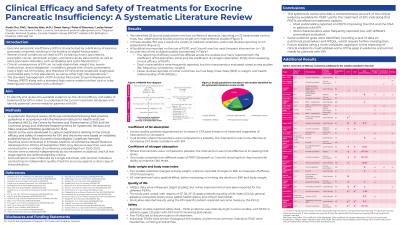Monday Poster Session
Category: Biliary/Pancreas
P1424 - Clinical Efficacy and Safety of Treatments for Exocrine Pancreatic Insufficiency: A Systematic Literature Review
Monday, October 23, 2023
10:30 AM - 4:15 PM PT
Location: Exhibit Hall

Has Audio
- PC
Paula Chu, PhD
Organon
Lucerne, Luzern, Switzerland
Presenting Author(s)
Paula Chu, PhD1, Jasmina Mioc, MD2, Owen Henry, BSc3, Peter O'Donovan, MSc3, Louise Heron, MA, MSc3
1Organon, Lucerne, Luzern, Switzerland; 2Organon Canada, Kirkland, PQ, Canada; 3Adelphi Values PROVE, Bollington, England, United Kingdom
Introduction: Exocrine pancreatic insufficiency (EPI) is caused by multiple clinical conditions such as cystic fibrosis (CF) and chronic pancreatitis. Standard management of EPI includes Pancreatic Enzyme Replacement Therapy (PERT) along with consultation with a dietitian. While PERT has been on the market for several decades, newer publications on the clinical efficacy and safety of PERT necessitated a comprehensive update of the literature. We aimed to identify the available evidence on the clinical efficacy and safety of treatments for EPI to understand the current treatment landscape.
Methods: A systematic literature review was conducted in Embase, Medline, and Evidence-Based Medicine databases from 2010–2022; conference proceedings from 2020–2022 were also searched. Articles were screened independently by two reviewers at abstract and full text stage against pre-defined eligibility criteria.
Results: We identified 26 journal publications and two conference abstracts, reporting on 22 randomized control trials, four observational studies and two single arm interventional studies. The most reported investigational treatment was pancrelipase, specifically Creon® (n=12). Thirteen studies reported coefficient of fat absorption (CFA) results. Across studies, patients experienced an increase in CFA post initiation of treatment regardless of intervention or timepoint. Mean change in CFA ranged from 7.5% in patients with CP who received placebo to 36% in patients with CP treated with Creon®. Nine studies reported coefficient of nitrogen absorption (CNA). Mean change in CNA ranged from 3.7% in patients with CP receiving placebo to 39.1% in patients with CP treated with Creon®. When compared to placebo, pancrelipase increased CNA levels. Only one study compared PERT brands head-to-head; however, no significant differences were reported in the CNA-72 h values (Creon® 82.0% [SE1.2] vs. Zenpep® 80.9% [SE 1.2]). Twelve studies reported body weight and body mass index (BMI); overall, treatment with PERT increased BMI and body weight or limited their decline. Creon increased BMI and body weight, with increases ranging from 0.1 to 6.1kg. Eighteen studies reported safety outcomes; overall, PERT was considered safe and well tolerated.
Discussion: This review confirmed that PERT is an effective and tolerable treatment option in patients with EPI. In the available evidence there was limited evidence for nutritional parameters and health-related quality of life.
Disclosures:
Paula Chu, PhD1, Jasmina Mioc, MD2, Owen Henry, BSc3, Peter O'Donovan, MSc3, Louise Heron, MA, MSc3. P1424 - Clinical Efficacy and Safety of Treatments for Exocrine Pancreatic Insufficiency: A Systematic Literature Review, ACG 2023 Annual Scientific Meeting Abstracts. Vancouver, BC, Canada: American College of Gastroenterology.
1Organon, Lucerne, Luzern, Switzerland; 2Organon Canada, Kirkland, PQ, Canada; 3Adelphi Values PROVE, Bollington, England, United Kingdom
Introduction: Exocrine pancreatic insufficiency (EPI) is caused by multiple clinical conditions such as cystic fibrosis (CF) and chronic pancreatitis. Standard management of EPI includes Pancreatic Enzyme Replacement Therapy (PERT) along with consultation with a dietitian. While PERT has been on the market for several decades, newer publications on the clinical efficacy and safety of PERT necessitated a comprehensive update of the literature. We aimed to identify the available evidence on the clinical efficacy and safety of treatments for EPI to understand the current treatment landscape.
Methods: A systematic literature review was conducted in Embase, Medline, and Evidence-Based Medicine databases from 2010–2022; conference proceedings from 2020–2022 were also searched. Articles were screened independently by two reviewers at abstract and full text stage against pre-defined eligibility criteria.
Results: We identified 26 journal publications and two conference abstracts, reporting on 22 randomized control trials, four observational studies and two single arm interventional studies. The most reported investigational treatment was pancrelipase, specifically Creon® (n=12). Thirteen studies reported coefficient of fat absorption (CFA) results. Across studies, patients experienced an increase in CFA post initiation of treatment regardless of intervention or timepoint. Mean change in CFA ranged from 7.5% in patients with CP who received placebo to 36% in patients with CP treated with Creon®. Nine studies reported coefficient of nitrogen absorption (CNA). Mean change in CNA ranged from 3.7% in patients with CP receiving placebo to 39.1% in patients with CP treated with Creon®. When compared to placebo, pancrelipase increased CNA levels. Only one study compared PERT brands head-to-head; however, no significant differences were reported in the CNA-72 h values (Creon® 82.0% [SE1.2] vs. Zenpep® 80.9% [SE 1.2]). Twelve studies reported body weight and body mass index (BMI); overall, treatment with PERT increased BMI and body weight or limited their decline. Creon increased BMI and body weight, with increases ranging from 0.1 to 6.1kg. Eighteen studies reported safety outcomes; overall, PERT was considered safe and well tolerated.
Discussion: This review confirmed that PERT is an effective and tolerable treatment option in patients with EPI. In the available evidence there was limited evidence for nutritional parameters and health-related quality of life.
Disclosures:
Paula Chu: Organon International GmbH – Employee.
Jasmina Mioc: Organon Canada – Employee.
Owen Henry: Adelphi Values PROVE – Employee.
Peter O'Donovan: Adelphi Values PROVE – Employee.
Louise Heron: Adelphi Values PROVE – Employee.
Paula Chu, PhD1, Jasmina Mioc, MD2, Owen Henry, BSc3, Peter O'Donovan, MSc3, Louise Heron, MA, MSc3. P1424 - Clinical Efficacy and Safety of Treatments for Exocrine Pancreatic Insufficiency: A Systematic Literature Review, ACG 2023 Annual Scientific Meeting Abstracts. Vancouver, BC, Canada: American College of Gastroenterology.
